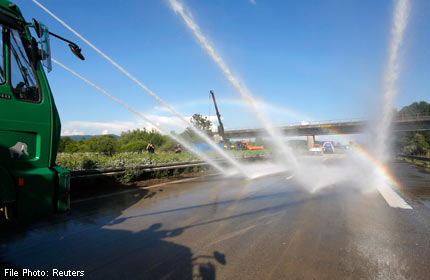
Turn the leftover mee pok or the remnants of that roast chicken into water?
This is not a figment of imagination. The technology, first developed in South Korea, has been adapted by local company Eco-Wiz and is now available here.
The machine that incorporates this technology is dubbed the ecoDigester and it sells for $30,000 to $80,000 per set, depending on capacity.
About 60 to 70 litres of water are produced for every 100kg of organic food waste processed.
The machine works with the use of micro-organisms, sold in powder form, to decompose waste at an accelerated speed.
Will this device finally resolve the problem of food wastage?
Perhaps, but Eco-Wiz's chief executive officer Renee Mison says that convincing local businesses and schools to adopt the technology is challenging.
The high cost of the machine has been a hurdle, but there is a deeper reason for the inertia: Resistance to the apparently tedious process of separating food from other forms of waste.

Although the stray piece of tissue paper or plastic fork will not cause the machine to malfunction, a process of sorting leftover noodles from paper cartons is required for the machine to work effectively.
Mrs Mison explains: "Sorting the leftovers sounds like a simple step to take. It's a habit children in many other countries like Korea are used to doing.
"But here, we're so used to dumping everything into a plastic bag and throwing it away... There's a mental block when it comes to adopting the habit of sorting."
In New York, plans are underway to hire a composting plant which will handle nine million kilograms of food scraps a year, an amount that represents about 10 per cent of the city's residential food waste, reported The New York Times last month.
Officials also predict that within a few years, recycling will no longer be an option.
New Yorkers who do not separate their food scraps could be subject to fines, just as they are now if they do not recycle plastic, paper or metal.
Over in Singapore, the National Environment Agency launched an $8 million fund to encourage companies to get into the habit of cutting back on waste and recycling.
Announced in 2009, The Reduce, Reuse and Recycle - or 3R - Fund pledged to co-fund eligible projects for up to 80 per cent of the costs over two years. There is now also a work group that looks at the underlying reasons for food wastage
"The workgroup has engaged relevant stakeholders such as food manufacturers, hawkers, hotels' operators, retailers and non-governmental organisations to better understand the issue on food waste, and the possible reduction of this waste or redistribution of excess food.
The agency has also developed various guidebooks to help businesses reduce waste, including food waste, says a spokesman.
Despite these efforts, Eco-Wiz, which manufactures the ecoDigester machines in its Woodlands factory, has rented and sold about 30 units over the past three years.
Although demand for the machines is slow, Mrs Mison is convinced of her product's benefits. Its list of clients include hotels like Crowne Plaza and Intercontinental Singapore and schools like Singapore Polytechnic.
"With the machine, half of the total waste you produce does not need to be sent to the landfill."
This can save companies up to 70 per cent of their waste disposal bill, she claims.
Aside from saving the environment, these food recycling machines also seems economical for companies.
"If a company purchases the machine, they could potentially save up to 70 per cent of waste disposal costs.
"Those who rent (the machine) see savings when they produce more than 500kg of food waste per day," says Ms Amanda Tan, sales manager at the company.
She adds that hotels here easily produce a tonne of food waste per day. Companies now pay according to how much waste needs to be carted away to be burned or buried in landfills.
The process of developing the technology began some three years ago, when she came across a Korean-made machine that turned food waste into sludge water.
Mrs Mison was so impressed by it that she bought over intellectual property rights, then pumped in her own capital to refine its functions.
Today, eco-Digester can turn food waste into clean water fed back to the sewage system.
"It took us more than two years to stabilise the technology," she says.
So far, she has spent "millions" on research and technology.
Mrs Mison's dream is for food recycling technology to penetrate into homes here, along with primary and secondary schools.
"If we can educate our kids to understand the benefits of food recycling and make it a way of life, they can go back and tell their parents and we can build a better tomorrow that way," she says.
How you can help
Create a food compost bin in your home by accumulating food scraps in a plastic bin after it has been lined with garden soil. Stir the compost every other day. The mixture can act as fertiliser for your plants.
Reduce food wastage by ordering just enough at food and beverage outlets, not more than you can consume.

